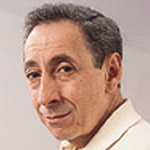 Between
the lines
Between
the lines
72
The December 10 New York Times described
Eugene R. Wedoff, AB’72, JD’75, as “a
judge known for being smart, aggressive and hands-on in
his approach to cases.” Those traits will no doubt
be called into play with a major case now on Wedoff’s
docket at the U.S. Bankruptcy Court in Chicago—the
Chapter 11 filing by United Airlines, the air-travel industry’s
biggest corporate failure to date. Before being appointed
a bankruptcy judge in 1987 Wedoff was a partner at Jenner
& Block.
 Photo by Lloyd
DeGrane
Photo by Lloyd
DeGrane |
| Poetry's
Joe Parisi |
73 At a
November 15 dinner marking the 90th anniversary of Poetry
magazine, Editor Joseph A. Parisi,
AM’67, PhD’73, announced that pharmaceuticals
heiress Ruth Lilly “has ensured our existence into
perpetuity,” through a no-strings-attached, 30-year
gift of $100 million–$150 million. The gift—the
largest ever to an institution devoted to poetry—made
headlines around the nation. Under her married name (Mrs.
Guernsey Van Riper Jr.), Lilly began submitting poems to
the magazine in the mid-1970s. Although Lilly’s poems
were never among the 300 or so chosen for publication each
year, she did receive several encouraging notes from Parisi,
who joined Poetry in 1977 and has been editor since
1983. As he told Chicago Tribune columnist Eric
Zorn, “I just wrote her a few nice words. I had no
idea who she was, of course.”
86 A “Forty
under 40” listing in the November 4 Crain’s
Chicago Business included five Chicago grads: Timothy
Landon, AB’86, MBA’93, president of Tribune
Classified Services, “oversaw the purchase of CareerBuilder
LLC, a national recruitment site, in 2000, and its merger
with Tribune’s CareerPath, one of the first job-posting
sites to hit the Internet.”
Julius W. Few, MD’92, assistant professor of
surgery at Northwestern’s Feinberg School of Medicine,
studies “subtle anatomical differences among various
ethnic groups, so that those differences can be preserved
in surgery.” Ricardo Estrada,
AM’93, is a Social Services Administration
grad and associate executive director at Erie Neighborhood
House, where he “has beefed up the center’s
computer labs and spearheaded a day-care program offering
computers and training to the mostly Latino women who provide
child care from their homes in the neighborhood.”
Sophia Siskel, AM’94,
director of exhibitions and education at the Field Museum,
“helped land upcoming shows on China’s Forbidden
City, ancient Egypt and the White House fashions of first
lady Jacqueline Kennedy.” Ron
Huberman, AM’00, MBA’00, uses his experience
as a beat cop, his master’s in social work, and his
business degree as head of the Chicago Police Department’s
office of information and strategic services, “working
with California-based database software giant Oracle Corp.
to put a laptop in every squad car.”
90 Any Brit
will tell you that Americans don’t speak standard
English, but, according to Bert Vaux,
AB’90, they don’t speak standard American
English either: “We are not all the same, and what
is considered bizarre in one part of the country might be
the norm in another part.” Vaux should know. The Harvard
associate professor of linguistics is compiling an atlas
of English dialects and, with some students, has launched
the online Dialect Survey to track the ways Americans agree
or disagree about how to use or pronounce words. When it’s
time to litigate, do you hire a law-yer (21 percent)
or loy-er (74 percent)? Is your mother’s
sister your ant (75 percent) or ahnt (11 percent—and
you’re probably from New England)? So far the survey
has received coverage in outlets from the New York Times
to Science. To read the clips and take the survey:
www.hcs.harvard.edu/~golder/dialect.
93 The January
1 Chicago Tribune asked experts about upcoming
trends in fields from space exploration to dating and relationships.
Weighing in on language trends was Erin McKean, AB’93,
AM’93, editor of Verbatim: The Language Quarterly.
Acronyms, McKean told the Trib, are going to be hot, very
hot: “The latest one is for ‘total information
awareness,’ TIA. I’ve seen CWC a lot for Chemical
Weapons Convention. The government is just acronym-happy.”
Another prediction: “[M]ore using of proper names
as shorthand cultural references. ‘That’s just
a little too Christina Aguilera.’”
— Mary Ruth Yoe


![]() Contact
Contact
![]() About
the Magazine
About
the Magazine ![]() Alumni
Gateway
Alumni
Gateway ![]() Alumni
Directory
Alumni
Directory ![]() UChicago
UChicago![]() ©2003 The University
of Chicago® Magazine
©2003 The University
of Chicago® Magazine ![]() 5801 South Ellis Ave., Chicago, IL 60637
5801 South Ellis Ave., Chicago, IL 60637![]() fax: 773/702-0495
fax: 773/702-0495 ![]() uchicago-magazine@uchicago.edu
uchicago-magazine@uchicago.edu
